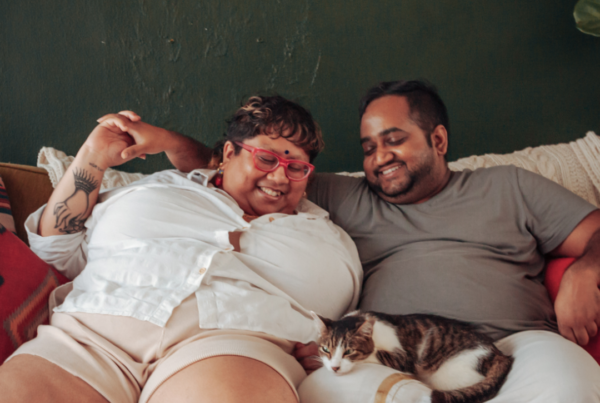Within the kink sphere, this is a question asked only in whispers, it is a subject held deeply inside the hearts of the many people who worry that going to therapy or seeking help for trauma would ultimately lead to “curing” them of their sexuality, but it’s hard to talk about it out loud, isn’t it? The difficulty is understandable, everything about this seems like such a problematic position. First of all, the belief that therapy cures trauma is a bit misguided in itself, as is the idea that there is a cure. Then there is the implication that the trauma or emotional dysfunction are what cause the sexuality you have to exist and if you were a “healthy” person, you would not be kinky, implying that kinky itself may come from mental health issues, sexual trauma or a replication of patterns of assault. This trope is a bit snore, but this question is more prevalent in the minds of people than we would care to admit.
I’ll admit that I have wondered about it myself.
There are parts of my sexuality that seem to exist because of and to reinforce certain traumas that I have experienced and when I was a teenager, I used to worry that if I got help for my sexual trauma, I would no longer enjoy my sexuality in its vile, wanton and disturbing way. I wondered if I would ever even have (penetrative) sex again if it stopped hurting and making me cry. Probably not. Look, in a perfect world, all our sexualities would be pristine, perfectly healthy and completely unproblematic, but I have never seen that world, so I’d much rather be truthful about mine. Trauma is not what built my sexuality, but parts of it are informed by trauma. Let me be clear about exactly what I mean by that. It’s not about what caused the trauma, it’s that the experience of the state of trauma made me realise that there are two parts of the experience: Injury and Intensity.
 The injury of it is what led to the PTS(D), the intensity of it is what led to the predilection for states of being that replicate that feeling. My sexual replication is not an attempt to retraumatize nor to cure, it’s an attempt to experience the intensity of trauma without the injury. It took me a long time to understand this and, on that path, I did often wonder if getting help or even helping myself would lead to a redefinition of my sexuality, and when I was younger, I thought that may mean that I would not be myself anymore. I also thought there was something to fix (and I was choosing not to fix it).
The injury of it is what led to the PTS(D), the intensity of it is what led to the predilection for states of being that replicate that feeling. My sexual replication is not an attempt to retraumatize nor to cure, it’s an attempt to experience the intensity of trauma without the injury. It took me a long time to understand this and, on that path, I did often wonder if getting help or even helping myself would lead to a redefinition of my sexuality, and when I was younger, I thought that may mean that I would not be myself anymore. I also thought there was something to fix (and I was choosing not to fix it).
This was not helped by the mental health professionals I approached or was sent to between the ages of fifteen and twenty-one. There are more progressive therapists than ever in the world today, even though access to them is governed by disparity, but back then, that wasn’t the case, and repeatedly, the conclusion about myself that was presented to me by therapists and psychiatrists was that the disease was in my desire to get smacked in the face which was definitely caused by being raped/abused. It was presented as an accusation—you have been hurt and now you are purposely doing things to make the hurt worse—and that just didn’t sit right with me because its greatest fallacy is not just its presumption but also its over-simplification. At this point, I could have very easily gone down a different path, I could have believed what I was being told by professionals and committed to curing my sexuality, I did not, because their case was weak and not well explored. Instead, I decided, at some point, to commit my mind to extreme, militant self-awareness. Now I’m not saying that I am qualified, equipped or able to perform therapy on myself, but I have learnt (from being in good, collaborative therapy with a competent mental health professional) that self-discovery and awareness are a vital part of the process, and because that part of the process has been second-nature to me for over a decade, at some point, the fear of learning something about myself that would fundamentally change how I approach sexuality or myself went away.
I have seen, and understand, that sometimes the way this plays out is that we become scared of discovery and the prospect of change, and that makes us believe that the less we delve into the mire of our traumas or dichotomies about our sexualities, the more comfortably we’d be able to practise our sexualities. Or, we believe that sexuality is a necessarily safe-space and the only space where you can approach and restructure trauma to be more bearable/comprehensible but for myself, I have discovered, that if I cannot sit with my trauma and explore it on an idle Wednesday evening, I should not bring it to the dungeon on a Saturday night. The more I learn about myself, the more able I am to separate the injury of trauma from its intensity, my sexuality is a relatively safer space because I have explored my traumas outside of sexual spaces and understood how and why they have influence on the way I practise my sexuality. The main thing that I have learnt is that it is not so simple as byte-sized kink-affirming or shaming snippets of slogans. The grandstanding hurts the process.
 Some of the kinkfluencers, educators and hardcore players who need to make their point in 100-words or fewer, with engaging graphics on Instagram posts, who probably mean well or are just tired of being attacked for their sexualities, or are trying to broaden the audience to create more baseline awareness, make it seem like there are tenets of adherence like: trauma does not cause kink, everything you do in kink is perfectly healthy (or unhealthy, depending on who you are), my kink is a part of my fucked up etc. These statements aren’t wrong or right, they’re just woefully inadequate and too general. It’s like presenting a conclusion without the process or presenting a headline without the story, it’s just pointless, but also dangerous, because people who consume it, and believe the source to be reliable, start to parrot it and many times turn it into a cornerstone of their kink-philosophy even though there is no attempt to discover and learn their own understanding of it, or see how it applies to them, because it’s not so simple and it takes very little questioning to discover that it’s not so simple.
Some of the kinkfluencers, educators and hardcore players who need to make their point in 100-words or fewer, with engaging graphics on Instagram posts, who probably mean well or are just tired of being attacked for their sexualities, or are trying to broaden the audience to create more baseline awareness, make it seem like there are tenets of adherence like: trauma does not cause kink, everything you do in kink is perfectly healthy (or unhealthy, depending on who you are), my kink is a part of my fucked up etc. These statements aren’t wrong or right, they’re just woefully inadequate and too general. It’s like presenting a conclusion without the process or presenting a headline without the story, it’s just pointless, but also dangerous, because people who consume it, and believe the source to be reliable, start to parrot it and many times turn it into a cornerstone of their kink-philosophy even though there is no attempt to discover and learn their own understanding of it, or see how it applies to them, because it’s not so simple and it takes very little questioning to discover that it’s not so simple.
For instance, is trauma an influence on my sexuality? Yes, but not in the way you think. It didn’t break me in some specific way so as to make me seek out these “fucked up” things, no, its occurrence alerted me to the possibility of a state of intensity I could find quite gratifying (if it presented without injury) and created the associations with certain activities/occurrences/sexual acts as a proven means to attaining that gratification. I am turned on by the association to intensity but it is also true that if the particular instance of trauma had not occurred, I would probably not be as into those things. See, not so simple. Does approaching my trauma this way necessarily mean it is healthy? No, there are layers to it. The process of association is about approaching the intensity or redefining the nature of my association with the trauma itself, the process of dealing with (through therapy, self-awareness, active discussion, support, examination etc) trauma is about reducing, understanding and managing the injury of it. I find I need those processes to work in tandem, and if there is a breakdown on either side, it manifests as dysfunction in both, which is okay and bound to happen from time-to-time, but fearing the admission and solution in response to it, seems detrimental to me.
Managing the injury does not reduce the pleasure of association, it enables it for the long-haul, and sometimes it has shown me how I was making decisions that were harmful for me. For example, the decision to engage in ritualistic, endurance-defined sexual play is about a trauma-association that is largely benign in terms of injury, but the decision to choose partners whose personalities (not sexualities) indicate that they would disregard and diminish my sexual needs through emotional violence is about the persistent injury of trauma. The former is health-neutral, the latter is unhealthy for me. See, not so simple.
 What does seem simple (and the most prevalent) to me is that if you are holding onto trauma because (you believe it to) enable the entirety of your sexuality which in turn defines your complete identity, you may be avoiding the process of self-aware reflection in fear of losing yourself. There was a moment when I was a teenager when I let myself believe that who I am is defined by how “fucked up,” “hardcore,” or “damaged” I am, but that I quickly learnt was a trauma-response to what had happened to me, and what had happened to does not define who I am. My sexuality is not driven by having been raped, it is driven by the understanding that I enjoy altered, intense states of human existence, relentless self-reflection and emotions as recreation. The former is circumstance (which, in some ways, may have even aided the process of discovering who I am, but so could many, many other things), and the latter is who I am, and that is who I would have been even in the absence of trauma, what would have been different would be my points of association. I cannot build an identity out of points of association, just plan activities and write poetry. If, at some point, of working through my trauma I find that certain sexual acts I used to enjoy are no longer appealing, then I will find different sexual acts that are appealing, because, it’s not the act, is It? It’s the feeling and headspace I am trying to experience, if you can’t get there one way, you find another way. If you find it just doesn’t appeal to you to go there anymore, you don’t go there anymore. So what? That could happen for a thousand reasons that have nothing to do with trauma. Sometimes, you just get bored! There are many things I used to love that I am sort of meh about now because I did them enough times that I experienced all the possibilities they had to offer. I am not going to keep doing something I no longer find enjoyable because it used to be a major part of who I used to be.
What does seem simple (and the most prevalent) to me is that if you are holding onto trauma because (you believe it to) enable the entirety of your sexuality which in turn defines your complete identity, you may be avoiding the process of self-aware reflection in fear of losing yourself. There was a moment when I was a teenager when I let myself believe that who I am is defined by how “fucked up,” “hardcore,” or “damaged” I am, but that I quickly learnt was a trauma-response to what had happened to me, and what had happened to does not define who I am. My sexuality is not driven by having been raped, it is driven by the understanding that I enjoy altered, intense states of human existence, relentless self-reflection and emotions as recreation. The former is circumstance (which, in some ways, may have even aided the process of discovering who I am, but so could many, many other things), and the latter is who I am, and that is who I would have been even in the absence of trauma, what would have been different would be my points of association. I cannot build an identity out of points of association, just plan activities and write poetry. If, at some point, of working through my trauma I find that certain sexual acts I used to enjoy are no longer appealing, then I will find different sexual acts that are appealing, because, it’s not the act, is It? It’s the feeling and headspace I am trying to experience, if you can’t get there one way, you find another way. If you find it just doesn’t appeal to you to go there anymore, you don’t go there anymore. So what? That could happen for a thousand reasons that have nothing to do with trauma. Sometimes, you just get bored! There are many things I used to love that I am sort of meh about now because I did them enough times that I experienced all the possibilities they had to offer. I am not going to keep doing something I no longer find enjoyable because it used to be a major part of who I used to be.
Ultimately, the thing I fear above all else is stagnation and stillness, all of these things—change, growth, discovery, pain, healing, transformation—they are what drive creative pursuit (and I suppose, I view sexuality as a very creative space), they are what make life enjoyable, and if I stood in one place, holding onto an identity that makes sense right now because anything else is so terrifying, I would die while still alive. Dealing with my trauma didn’t fix the kink out of me, it made me realise that kink isn’t what needs fixing and it isn’t made of trauma, we can all use our sexualities (even the most non-kink ones) in healthy and unhealthy ways, we can do that with everything. Kink isn’t necessarily healthy or unhealthy, trauma-play isn’t necessarily good or bad, healing isn’t necessarily transformative or unchanging but if fear of knowing and changing yourself is necessarily the only way you can feel like yourself, the problem is not the fear that the therapy will fix your kink. It could be that the kink is all you think you are and if you believe that to be trauma-associated, then your view of kink itself may be a bit binary and reductive. It’s just, not so simple.
This chapter is an excerpt from Ancilla L’s latest book, What the Kink, which is a compilation of educational essays on fetishism and sexuality for the curious and entrenched alike.
To buy the book outside India, search by title on Amazon. To buy it in India, DM @ancillarykinksupport on Instagram, e-mail at lancilla80@gmail.com or message @AncillaL on Fetlife.





